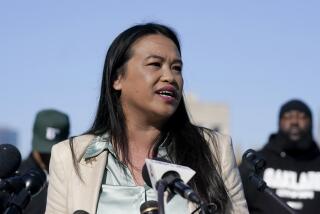Bias Dogs U.S.-Educated Hmong Lawyer
- Share via
MINNEAPOLIS — A few years after Christopher Thang Thao arrived in America, penniless and still learning English, he decided to become a lawyer.
His college adviser had two words of advice: Forget it.
“I said, ‘Maybe I need to prove you wrong,’ ” Thao recalled.
And so he did.
In 1986, after 10 years in the United States, Thao was graduated from St. Paul’s William Mitchell College of Law. He is believed to be the first Hmong attorney in the nation.
Thao’s success is the stuff of Horatio Alger: A determined young man from a small village in Laos survives the horrors of war and misery of a refugee camp, dreams of a good education and a better life and sets out for America against his father’s wishes.
Thao, now 34, is a U.S. citizen, husband, father of five and homeowner. He recently opened his own law practice.
“I don’t think there’s any magic in it,” Thao said. “It’s a matter of desire and having some access to what you want to become.”
Thao says that at times, he still feels like a second-class citizen, ignored by merchants and invisible to colleagues. And he is haunted by painful memories of his early years in this country, when children spat at him and shouted racial epithets.
But Thao persisted. He worked as a janitor. He borrowed money. All the time he pushed, pushed, pushed to get an education.
“Education was something quite special for my dad,” recalled Thao, who was one of 11 children. “He wanted to go to school when he was young and his father said no.”
Thao’s parents came to the United States two years after he did. It was then that he began to realize more clearly what red tape and hardships refugees face. By the time he entered law school, his father was gravely ill.
“My father loved me very much,” he said. “The only thing I could do to show him that I loved him and be a good son was to complete my studies.”
Thao crammed a three-year law course into 2 1/2 years, and after he got his degree, his father threw him a big party. The next month, his father died.
As a lawyer, Thao, who took his Christian first name for business purposes, specializes in helping Southeast Asians with personal injury and workers’ compensation claims.
He said he faces discrimination on the job--and off.
“Once in a while, you encounter some attorneys who look at you as if you did not exist,” Thao said. “They say things like ‘Your case is nothing at all; your people are on welfare; just give them a couple of thousand dollars and that’ll satisfy them.’ ”
“It’s kind of made me feel like human beings are not equal, unless you are white, born and raised in this country,” he said. “I still feel like I am a different person and I cannot have the same privileges and same benefits.”
For example, Thao, a leader in the Hmong community, said that when he recently went shopping for a car he had to seek out help, while another customer who came in later was waited on immediately.
“I wish that people would treat me fairly and treat me with dignity and with equality,” he said. “Even with the success I have achieved, you still feel like a second-class citizen from time to time.”
“I want to stay here. I want to make it here,” he said. “I want to build my life here and my children’s lives here, but I find that people tend to exclude me no matter how hard I try.”
More to Read
Sign up for Essential California
The most important California stories and recommendations in your inbox every morning.
You may occasionally receive promotional content from the Los Angeles Times.













